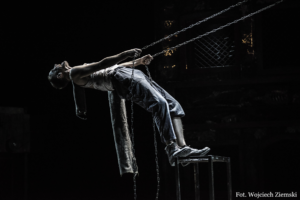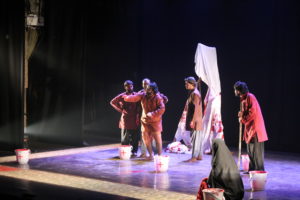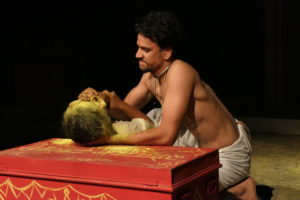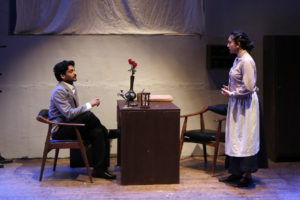It’s me, Edith Piaf by Nina Mazur
The Play
It’s me, Edith Piaf is a monodrama performance in German or Russian (both are possible) with songs of Edith Piaf’s repertoire in original language. When alive, she was called ‘The Soul of the French Nation’. After she died she became an icon of French music. The songs of her repertoire are still popular in the whole world. The legendary singer, who began her career on the Parisian pavements, answered the question about the meaning of her life with “Love. What else?” This production on the play written by Nina Mazur has been created by the alumnae of St. Petersburg Theatre Academy.
The Director
Evgenia Boginskaya, theatre director and actress, born in 1984, lives in St. Petersburg. She graduated as an actress from the Theatre Academy of Vadivostok. While being an actress she felt that the boundaries of her activity could be wider. She moved to St. Petersburg, where she studied at the Academy of Theatre Arts under the Russian legendary theatre teacher, V. Filshtinsky. In 2016 she graduated and got the diploma for being a theatre director. She has been working as a theatre director and a teacher of acting, with professional actors since 2008. Her directorial works include A Wife written by A. Chekhov, Antony and Cleopatra by W. Shakespeare, A holiday long sleep by N.
Ostrovsky, The choir is dying by A. Volodin, Three Stories based on A. Skivko-Korovkina’s play Bugs, It’s me, Edith Piaf by N. Mazur, and Rainbows over Hiroshima by Inoue Hisasi. Evgenia has worked as an acting teacher at Teatr Nowy im. T. Łomnickiego, Poznan, Poland; Teatr Zagłębia, Sosnowiec, Poland; and Teatr Współczesny im. Edmunda Wiercińskiego, Wroclaw, Poland.
The Playwright
Nina Mazur (Germany, Hanover) was born in Bishkek, Kirgizstan. She graduated from Moscow State Theatre Academy (GITIS), Faculty of History and Theory of Theatre, and post-graduated at St. Petersburg Academy of Theatre, Music and Cinema. Before leaving for Hanover, she worked at the theatre department of Ukrainian Ministry of Culture and Arts (Kiev), and was a professor of History of Art in the University. Nina Mazur is the creator, coordinator and consultant of many international theatre festivals all around the world. Her activity in ITI, UNESCO is well-known. She is the Vice- President of Monodrama Forum, International Theatre Institute, UNESCO, and a member of German Centre of ITI. Nina Mazur is also a member of the International Association of Theatre Critics (IATC) and a member of the International Dance Council by UNESCO. She is a theatre critic and author of
many articles on theatre in professional magazines. She is also the author of the book The Stage Interpretations of the Ballets of Ukrainian Composers. Nina Mazur is a member of literature society Die Faehre (Hanover, Germany) and a member of literature association APIA (London, UK). She is a playwright and her plays have been translated into many languages and staged in many countries.
The Group
Internationales Berliner Drama Theater (International Berlin Theatre of Drama) was founded in 2014 by the German actress, Anastasia Weinmar and her stage partner and an honorary actor of Russia, A. Ivanov, as an international company of professional theatre artists. It aims to exchange scenic experiences between West and East European theatre traditions and to promote the culture of each other. In three years of its existence, the IBDT has created 3 plays. The 4 th production is being rehearsed. The last production of the company, a monodrama after Nina Mazur’s play, It’s me, Edith Piaf has been performed all-over Europe and was/is invited to numerous monodrama festivals, such as Saint Muse in Ulaanbaatar (Mongolia), Impulse in Bishkek (Kirgizstan), Maria in Kiev (Ukraine),
Small Theatre Festival in Lublin (Poland), and Albamono in Albania.
Cast & Credits
Edith Piaf : Anastasia Weinmar
Set & Costume : Ilshat Vildanov
Musical Arrangement : Natalia Smotritskaya
Playwright : Nina Mazur
Direction : E. Boginskaya



